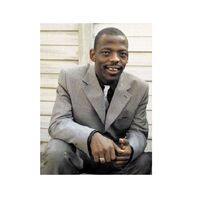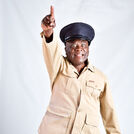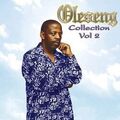
Oleseng
9702 fãs
OLESENG SHADRACK SHUPING was born in Bochabelo, near Bloemfontein in 1963. Shortly afterwards, his parents relocated to Atteridgeville, west of Pretoria, where OLESENG grew up and attended school, matriculating in 1989.
Raised in a devout Christian family where going to church, the inimitable Zion Christian Church, was a way of life, the youngster almost never developed any interests outside the church. His entire character was shaped by the Christian upbringing consistent with the ZCC.
Thinking back to his early childhood, OLESENG says he was inspired by his musical family. As he once fondly recalled: “I remember the great sing-a-long evenings with my late mom, sisters and brother.”
Early singing career with The Atteridgeville Happy Boys
He started singing at 14 as leader of an Mkhukhu ensemble from Atteridgeville which ultimately became known as The Atteridgeville Happy Boys.
Mkhukhu is the music and dance of the Zionist church. To appreciate the magic and the artistry of Mkhukhu, one needs to actually see and hear the young men resplendent in their khakis and white manyanyathas - parading their dazzling skill and raising their soprano, tenor and baritone voices in worship on dusty township streets. They are just a marvel to behold!
The story of how the group was formed is of particular interest. They emerged in 1976, at the height of the young black rebellion and the birth of political consciousness among township youths. Instead of jumping on the bandwagon of arsonists and looters of government buildings, they thought it wise to channel their energies into the arts. At the time, the oldest member of the group was a youthful 22 and the feeling that they were losing out on an opportunity to be a part of history wasn’t that overwhelming.
So they left the political fireball in the capable hands of activists and concentrated their endeavors on what they knew best, music of the ZCC.
The result was a force to reckon with in the greater Pretoria area as they became a much sought-after group to entertain at social functions and weddings. Their Mkhukhu style of performance quickly endeared them to the hearts of many music lovers, even people outside the ZCC. For sixteen years they played the social circuit, without a thought for recording their music, until they were inundated with pleas from a number of people who had heard them sing, to record their music.
Oleseng once confessed “we were still young boys at the time, each with no wish greater than to finish school.”
Recording Career
The Atteridgeville Happy Boys first album - entitled ‘Mahlomoleng Aka’ and released in 1992 - was a direct response to this request from the fans and two more albums followed until they decided against the selling of their music. “We were being ripped off by the record companies,” said Oleseng at the time, “and we felt there was no point really in continuing if all we were doing was making other people rich at our expense. We had serious problems getting our royalties and we had to move on”
Eventually in 1998, having experienced contractual problems with his former record label, OLESENG decided to seek greener pastures and joined Cool Spot Productions – where he recorded his debut solo multi-platinum hit album “Segopololo Boikgantsho”.
Thus began a long and successful recording career with The Atteridgeville Happy Boys and the African Gospel Singers (his solo backing group) which garnered OLESENG a string of successive multi platinum albums.
His ability to turn out platinum-after-platinum selling hits was due in the main to his skill in re-inventing his music without losing his trademark identity. Each successive release set a new trend that others imitated and followed. He wrote all his own songs and musical arrangements and at the heart of OLESENG’s success was his ability to write about his own life experiences that people could easily relate to and to produce music that teaches, heals and entertains.
Coming from Atteridgeville where jazz is on the lips of everyone, it’s not surprising that OLESENG also recorded two English albums, where he successfully fused Afro-jazz rhythms with gospel messages.
An unwavering Christian and musical prophet endowed with a passion and commitment to spread the word of God, OLESENG had the uncanny ability to weave gospel rhythms and melodies that made his offerings enjoyable to a multitude of followers - believers and non-believers, old and young alike.
Church
Until his accident, OLESENG was effectively an active member of the ZCC since he was born. This setback, major as it was, did not dissuade OLESENG from the path of serving the Lord.
OLESENG died on the morning of 12 July 210, exactly 49 months after his motor accident. (See separate press release and brief history for further details)
Although gone, he will be remembered. OLESENG has left us a wonderful legacy of songs to cherish forever.
Raised in a devout Christian family where going to church, the inimitable Zion Christian Church, was a way of life, the youngster almost never developed any interests outside the church. His entire character was shaped by the Christian upbringing consistent with the ZCC.
Thinking back to his early childhood, OLESENG says he was inspired by his musical family. As he once fondly recalled: “I remember the great sing-a-long evenings with my late mom, sisters and brother.”
Early singing career with The Atteridgeville Happy Boys
He started singing at 14 as leader of an Mkhukhu ensemble from Atteridgeville which ultimately became known as The Atteridgeville Happy Boys.
Mkhukhu is the music and dance of the Zionist church. To appreciate the magic and the artistry of Mkhukhu, one needs to actually see and hear the young men resplendent in their khakis and white manyanyathas - parading their dazzling skill and raising their soprano, tenor and baritone voices in worship on dusty township streets. They are just a marvel to behold!
The story of how the group was formed is of particular interest. They emerged in 1976, at the height of the young black rebellion and the birth of political consciousness among township youths. Instead of jumping on the bandwagon of arsonists and looters of government buildings, they thought it wise to channel their energies into the arts. At the time, the oldest member of the group was a youthful 22 and the feeling that they were losing out on an opportunity to be a part of history wasn’t that overwhelming.
So they left the political fireball in the capable hands of activists and concentrated their endeavors on what they knew best, music of the ZCC.
The result was a force to reckon with in the greater Pretoria area as they became a much sought-after group to entertain at social functions and weddings. Their Mkhukhu style of performance quickly endeared them to the hearts of many music lovers, even people outside the ZCC. For sixteen years they played the social circuit, without a thought for recording their music, until they were inundated with pleas from a number of people who had heard them sing, to record their music.
Oleseng once confessed “we were still young boys at the time, each with no wish greater than to finish school.”
Recording Career
The Atteridgeville Happy Boys first album - entitled ‘Mahlomoleng Aka’ and released in 1992 - was a direct response to this request from the fans and two more albums followed until they decided against the selling of their music. “We were being ripped off by the record companies,” said Oleseng at the time, “and we felt there was no point really in continuing if all we were doing was making other people rich at our expense. We had serious problems getting our royalties and we had to move on”
Eventually in 1998, having experienced contractual problems with his former record label, OLESENG decided to seek greener pastures and joined Cool Spot Productions – where he recorded his debut solo multi-platinum hit album “Segopololo Boikgantsho”.
Thus began a long and successful recording career with The Atteridgeville Happy Boys and the African Gospel Singers (his solo backing group) which garnered OLESENG a string of successive multi platinum albums.
His ability to turn out platinum-after-platinum selling hits was due in the main to his skill in re-inventing his music without losing his trademark identity. Each successive release set a new trend that others imitated and followed. He wrote all his own songs and musical arrangements and at the heart of OLESENG’s success was his ability to write about his own life experiences that people could easily relate to and to produce music that teaches, heals and entertains.
Coming from Atteridgeville where jazz is on the lips of everyone, it’s not surprising that OLESENG also recorded two English albums, where he successfully fused Afro-jazz rhythms with gospel messages.
An unwavering Christian and musical prophet endowed with a passion and commitment to spread the word of God, OLESENG had the uncanny ability to weave gospel rhythms and melodies that made his offerings enjoyable to a multitude of followers - believers and non-believers, old and young alike.
Church
Until his accident, OLESENG was effectively an active member of the ZCC since he was born. This setback, major as it was, did not dissuade OLESENG from the path of serving the Lord.
OLESENG died on the morning of 12 July 210, exactly 49 months after his motor accident. (See separate press release and brief history for further details)
Although gone, he will be remembered. OLESENG has left us a wonderful legacy of songs to cherish forever.
Álbuns
| Collection Vol.2 |
| Ha Ditshwane |
| Oleseng Collection Vol 1 |
| The Best Of Oleseng |
| Tsa Bofelo Vol. 2 |
| Tsa Bofelo |
| Dithoriso Diye Gontate |
| Hareatla Ka Boikhantsho |
| I Need Your Touch |
| My Shepherd |
| Kea Cha, Kea Tuka |
| Glory To God |
| Difela Tsa Sione Ka Oleseng Volume 2 |
| Sentebale Le Nna |




















